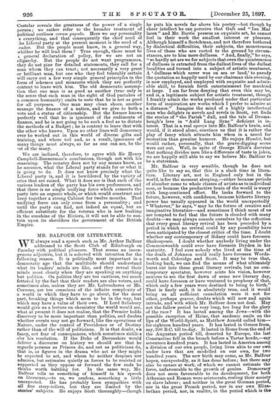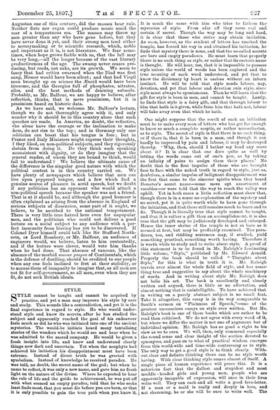MR. BALFOUR ON LITER/V.1 URE.
WE always read a speech such as Mr. Arthur Balfour addressed to the Scott Club of Edinburgh on Tuesday with political pleasure. That seems an incon- gruous adjective, but it is selected with intention for the following reason. It is politically most important in a democratic age that the multitude should understand what its leaders' minds are like, and they reveal their minds most clearly when they are speaking on anything but politics. On politics they are too cautious, too much fettered by the fact that their readers are also voters, and sometimes also, unless they are Mr. Laboucheres or Mr. Curzons, are too conscious of the infinite complexity of a world in which they have to go about, for the most part, breaking things which seem to be in the way, but which may have a value of their own. If Lord Salisbury would give us a lecture on chemistry the world would see, what at present it does not realise, that the Premier holds discovery to be more important than politics, and doubts whether events may not go forward, like the operations of Nature, under the control of Providence or of Destiny rather than of the will of politicians. It is that doubt, we fancy, not fear of consequences, which sometimes sicklies o'er his resolution. If the Duke of Devonshire would deliver a discourse on history we should see that he regards persons as Princes do, and not as politicians do, that is, as figures in the drama who act as they might be expected to act, and whom he neither despises nor admires, but estimates quietly as forces to be resisted or supported as they oppose or forward the few ends he thinks worth battling for. In the same way, Mr. Balfour tells us something of himself in his speech on literature,—to us, we confess, something a little unexpected. He has probably keen sympathies with all fine story-tellers, but they are limited by the atones' subjects. He enjoys Scott thoroughly—though he puts his novels far above his poetry—but though by sheer intellect he can perceive that Galt and " Ian Mac laren " and Mr. Barrie possess an exquisite art, he cannot feel in their work the smallest interest or pleasure. Although himself a Scotchman, and not therefore bothered by dialectical difficulties, their subjects, the monotonous lives of those who are rooted to the ground by circum- stances, are to him mere dullness. "And, finally," he says, " so hardly set are we for subjects that even the quintessence of dullness is extracted from the dullest lives of the dullest localities and turned into a subject of artistic treatment. A dullness which never was on sea or land,' to parody the quotation so happily used by our chairman this evening, is now employed, and employed with exquisite and admir- able skill, to furnish forth entertainment for mankind at large. I am far from denying that even this may be, and is, a legitimate subject for artistic treatment, though I frankly admit the works produced under that particular form of inspiration are works which I prefer to admire at a distance." Imagine the mind of a highly intellectual man who delights in novels and revels in Scott, yet finds the stories of " the Parish" dull, and the tale of Drums- heugh's love in "Auld Lang Syne " deficient in in- terest. That is a real apercu into Mr. Balfour's brain, and would, if it stood alone, convince us that it is rather the play of fancy which attracts him when in a mood for recreation than genuine humour. He enjoys Hamlet, but would rather, personally, that the grave-digging scene were cut out. Well, in spite of George Eliot's doctrine that nothing divides men like a difference of taste in jokes, we are happily still able to say we believe Mr. Balfour to be a statesman.
Mr. Balfour is very sensible, though he does not quite like to say so, that this is a slack time in litera- ture. Literary art, not in England only but in the world, is for the moment sleeping,—either because periods of slumber come to whole classes of artists as to individual men, or because the productive brain of the world is weary with long-continued effort. He looks forward to the future, however, with confidence, because hitherto literary power has usually appeared in the world unexpectedly " Whatever," he says, " may be the future of creative and imaginative literature—and sometimes I think most of us are tempted to feel that the future is clouded with many doubts—we may always console ourselves by the reflection that every great literary revival has been preceded. by a period in which no revival could by any possibility have been anticipated by the closest critics of the time. I doubt whether any contemporary of Sidney could have foreseen Shakespeare. I doubt whether anybody living under the Commonwealth could ever have foreseen Dryden in his maturity. I feel sure nobody who lived at the time of the death of Johnson could really have foreseen Words- worth and Coleridge and Scott. It may be true that, looking back, we can find the means of what ultimately burst out into these great literary revivals, but no con- temporary spectator, however acute his vision, however anxious to see the first dawn of some new literary day, could have foreseen or have ventured to prophesy of that, which only a few years were destined to bring to birth." That is finely said, it is absolutely true, and it would bring us all sufficient consolation were it not for other, perhaps graver, doubts which will now and again intrude, and with which Mr. Balfour does not deal. May not the fallow period be very long, too long for the glory of the race ? It has lasted among the Jews—with the possible exception of Heine, that sardonic smile on the lips of the World-Spirit, as Matthew Arnold called him— for eighteen hundred years. It has lasted in Greece from, say, 300 B.C. till to-day. It lasted in Rome from the end of the Augustan period till, deserted by Europe, the last Constantine fell in the breach before a Tartar horde,—say seventeen hundred years. It has lasted in America among a division of our own people, living lives akin to our own under laws that are modelled on our own, for two hundred years. The new birth may come, as Mr. Balfour hopes, unexpectedly, as it has done before ; but there may also be causes at work, of which we cannot estimate the force, unfavourable to the growth of genius. Democracy does not seem favourable to its development, for both Athenian and Roman were aristocrats, resting their society on slave labour; and neither in the great German period, nor in the great French period, nor in our own Eliza. bethan period, nor, in reality, in the period which is the Augustan one of this century, did. the masses bear rule. Neither flute nor organ could produce music amid the roar of a tempestuous sea. The masses may throw up men greater than any who have gone before, but they have never done it yet, and their strong men tend either to moneymaking or to scientific research, which, noble and important as it is, is not literature. We fear some- times, when hope grows feeble with us, that the lull may be very long,—all the longer because of the vast literary productiveness of the age. The swamp never ceases pro- ducing, but reeds, not oaks, are its growth. We seem to fancy that had critics swarmed when the Iliad was first sung, Homer would have been silent; and that had Virgil peen brought up on science the 2Eneid would have been tiresome, and the Georgics full of phosphates, nitrates, silos, and the best methods of draining subsoils. Probably, as Mr. Balfour, we are happy to believe, after reflection, thinks, that is mere pessimism, but it is pessimism based on historic data.
As we have said, we welcome Mr. Balfour's lecture, though we do not thoroughly agree with it, and only wonder why it should be in this country alone that such speeches are made. In America, no doubt, the reflective, vho alone have the courage or the inclination to make ;hem, do not rise to the top ; and in Germany only one Dolitician can boast that his tongue is free ; but in France and Italy Ministers might express their thoughts, f they liked, on non-political subjects, and they rigorously Lbstain from doing it. Do they think such speaking nconsistent with dignity, or do they imagine that the general reader, of whom they are bound to think, would fail to understand ? We believe the ultimate cause of the difference is the singular good nature with which the political contest is in this country carried on. We have plenty of newspapers which believe that men can live upon peppered tongue, and a few which find a genuine source of pleasure in acrid speech, but we doubt if any politician has an opponent who would attack a non-political speech because the speaker was not a friend. That is at it should be, and although the good humour is often explained as arising from the absence in England of serious subjects of dissension, some part of it ought, we believe, to be ascribed to the national temperament. There is very little true hatred here even for unpopular men, and the politician who could not deliver a good lecture on a social subject to any audience with a per- fect immunity from hissing has yet to be discovered. If Colonel Dyer himself could talk like Sir Stafford North- cote, or Lord Rosebery, or Mr. Balfour, an audience of engineers would, we believe, listen to him contentedly, and if the lecture were clever, would vote him thanks when he had done. That absence of rancour, like the absence of the morbid amour propre of Continentals, which is the defence of duelling, should be credited to our people when any one feels inclined to fret at their stolidity, or to accuse them of incapacity to imagine that, as all men are not fit for self-government, so all men, even when they are fit, do not seek British ideals.



































 Previous page
Previous page